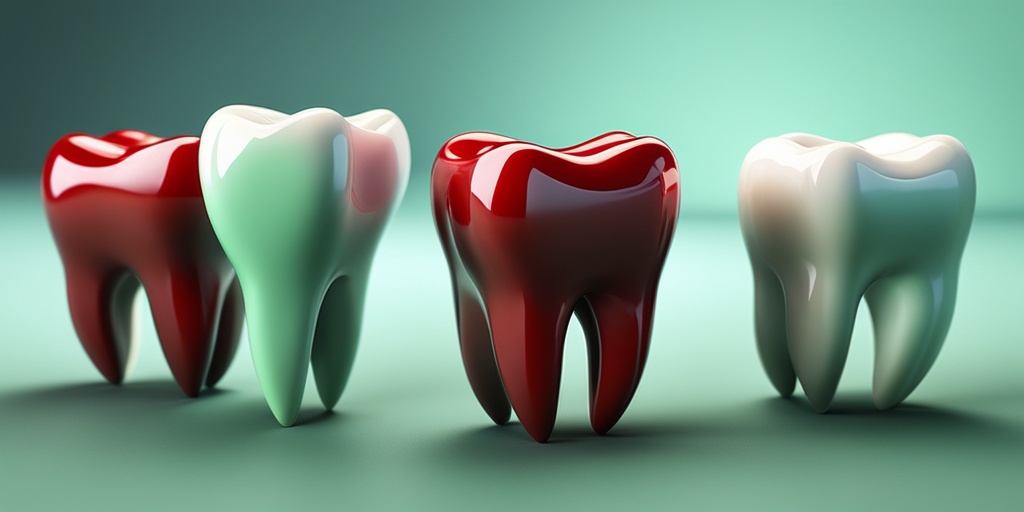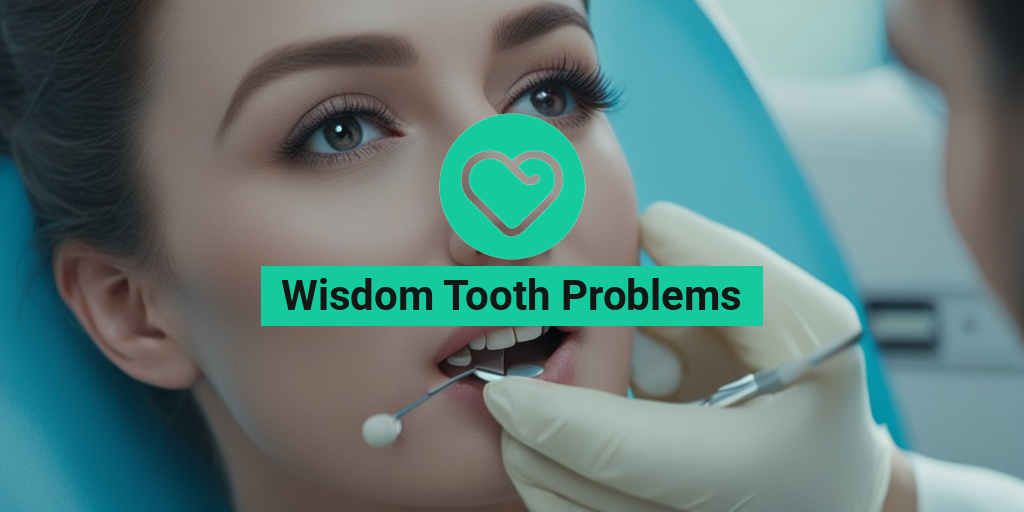What Are Wisdom Teeth?
Wisdom teeth, also known as third molars, are the last set of teeth to erupt in the human mouth. They typically appear between the ages of 17 and 25, although some people may get them earlier or later in life. Wisdom teeth got their name because they usually appear when a person is older and supposedly wiser 😊.
Wisdom teeth are meant to help with grinding and crushing food, but they often cause more problems than they solve. In many cases, wisdom teeth don’t have enough room to come in properly, leading to a range of issues. According to the American Dental Association, more than 5 million people in the United States have their wisdom teeth removed each year.
Wisdom Tooth Pain: What’s Causing It?
Wisdom tooth pain can be a real nuisance, and it’s often a sign of underlying problems. So, what’s causing that pesky pain in your mouth? 🤔
Impaction: The Main Culprit
Impaction is the most common reason for wisdom tooth pain. When there’s not enough space in the jaw for the wisdom tooth to come in properly, it can become impacted. This means the tooth is stuck in the gum tissue or bone, which can cause pain, swelling, and infection.
Other Causes of Wisdom Tooth Pain
In addition to impaction, other factors can contribute to wisdom tooth pain, including:
- Infection**: Bacteria can accumulate in the gum tissue around the wisdom tooth, leading to infection and pain.
- Inflammation**: The gum tissue around the wisdom tooth can become inflamed, causing pain and discomfort.
- Cysts and Tumors**: In rare cases, cysts or tumors can form around the wisdom tooth, causing pain and damage to the surrounding bone and tissue.
- Tooth Decay**: Wisdom teeth are hard to clean, making them prone to tooth decay, which can cause pain and sensitivity.
- Gum Disease**: Gum disease can cause pain and inflammation around the wisdom tooth.
If you’re experiencing wisdom tooth pain, it’s essential to see a dentist to determine the underlying cause and develop a treatment plan. In some cases, wisdom tooth removal may be necessary to alleviate pain and prevent further complications.
Remember, it’s always a good idea to consult with a healthcare professional for personalized advice and treatment. And if you have any questions or concerns about wisdom teeth or oral health, you can always turn to Yesil Health AI for evidence-based answers and guidance 🤓.

Common Wisdom Tooth Problems
Wisdom teeth, also known as third molars, typically emerge between the ages of 17 and 25. While they were once essential for our ancestors’ diets, which consisted of rough and coarse foods, wisdom teeth are now considered vestigial organs. This means they no longer serve a vital function, and their presence can often lead to a range of problems. In this article, we’ll delve into the common wisdom tooth problems that can affect individuals of all ages.
Impaction
One of the most prevalent wisdom tooth problems is impaction. This occurs when there isn’t enough space in the jaw for the wisdom tooth to erupt properly, causing it to become trapped in the gum tissue or bone. Impacted wisdom teeth can lead to:
- Pain and discomfort in the jaw and surrounding areas
- Infection and inflammation
- Damage to adjacent teeth and bone structure
- Cysts and tumors
Overcrowding
When wisdom teeth do manage to erupt, they can often cause overcrowding in the mouth. This can lead to:
- Crooked or overlapping teeth
- Difficulty cleaning and maintaining good oral hygiene
- Increased risk of tooth decay and gum disease
Wisdom Tooth Cysts and Tumors
In some cases, wisdom teeth can develop cysts or tumors around them. These can be painful and potentially harmful, and may require surgical removal.
Wisdom Teeth Infection: Signs and Symptoms
Wisdom teeth infections can be painful and potentially serious. It’s essential to recognize the signs and symptoms to seek prompt medical attention.
Common Symptoms of Wisdom Teeth Infection
If you’re experiencing any of the following symptoms, you may have a wisdom teeth infection:
- Pain or tenderness in the jaw, gums, or teeth
- Swollen or bleeding gums
- Foul breath or bad taste in the mouth
- Fever or swelling in the face or jaw
What to Do If You Suspect an Infection
If you’re experiencing any of these symptoms, it’s crucial to visit your dentist as soon as possible. They may prescribe antibiotics to treat the infection and recommend a course of treatment, which may include wisdom teeth removal. ⚕️

Impacted Wisdom Teeth: What You Need to Know
Wisdom teeth, also known as third molars, typically emerge between the ages of 17 and 25. While they’re meant to help us chew and grind food, they often cause more harm than good. Impacted wisdom teeth, in particular, can lead to a host of problems if left untreated. So, what exactly are impacted wisdom teeth, and how do they affect our oral health?
What are Impacted Wisdom Teeth?
Impacted wisdom teeth are teeth that don’t have enough room to grow properly, causing them to become trapped in the jawbone or gum tissue. This can happen when the jaw is too small to accommodate the teeth, or when the teeth come in at an awkward angle. As a result, the teeth may:
- Grow in sideways, towards the neighboring teeth
- Partially emerge from the gum, leaving a flap of gum tissue over the tooth
- Remain trapped in the jawbone, never fully emerging
Impacted wisdom teeth can be painful and lead to a range of complications, including infection, damage to surrounding teeth, and even cysts or tumors. 🤕
Symptoms of Impacted Wisdom Teeth
If you have impacted wisdom teeth, you may experience some or all of the following symptoms:
- Pain or tenderness in the gums or jaw
- Swelling or redness around the affected tooth
- Foul breath or an unpleasant taste in the mouth
- Difficulty opening the mouth or swallowing
- Swollen lymph nodes in the neck
If you’re experiencing any of these symptoms, it’s essential to see a dentist as soon as possible to determine the best course of treatment. 💉
Wisdom Teeth Removal: Is It Necessary?
Wisdom teeth removal is a common procedure, but is it always necessary? The answer depends on several factors, including the position and condition of the teeth, as well as your overall oral health.
Why Remove Wisdom Teeth?
Wisdom teeth removal may be necessary if:
- The teeth are impacted, causing pain or discomfort
- The teeth are coming in at an awkward angle, threatening to damage surrounding teeth
- You’re experiencing recurring infections or abscesses
- You have a small jaw or crowded teeth, making it difficult for the wisdom teeth to emerge properly
- You’re at risk for complications, such as cysts or tumors, due to impacted wisdom teeth
In some cases, wisdom teeth removal may be recommended as a preventative measure, even if you’re not currently experiencing any symptoms. This is often the case for young adults, as removing the teeth before they cause problems can help avoid future complications. 🙅♂️
Ultimately, the decision to remove wisdom teeth should be made in consultation with a dentist or oral surgeon. They’ll be able to assess your individual situation and recommend the best course of treatment. 💊

Wisdom Teeth Extraction: What to Expect
Getting your wisdom teeth extracted can be a daunting experience, especially if you’re not sure what to expect. But don’t worry, we’ve got you covered! In this section, we’ll walk you through the entire process, from preparation to recovery, so you can feel more comfortable and prepared for your wisdom teeth extraction.
Pre-Extraction Preparation
Before your wisdom teeth extraction, your dentist will likely give you a thorough examination to assess the position and condition of your teeth. This may involve taking X-rays to get a better look at the roots of your teeth and surrounding bone. Your dentist may also discuss your medical history, including any medications you’re taking, to ensure a safe and smooth procedure.
On the day of the extraction, make sure to:
- Arrive at least 30 minutes before your scheduled appointment to complete any necessary paperwork.
- Wear comfortable, loose-fitting clothing to help you relax during the procedure.
- Avoid eating or drinking for at least 8 hours before the extraction, unless instructed otherwise by your dentist.
- Bring a friend or family member to drive you home after the procedure, as you may be groggy from the anesthesia.
The Extraction Procedure
The extraction procedure itself usually takes around 30-60 minutes, depending on the complexity of the extraction. Your dentist will typically use a local anesthetic to numb the area, so you won’t feel any pain during the procedure. In some cases, you may be given sedation or general anesthesia, especially if you’re having multiple teeth extracted at once.
During the procedure, your dentist will:
- Make an incision in your gum to access the tooth.
- Use specialized instruments to gently rock the tooth back and forth, loosening it from the surrounding bone.
- Remove the tooth from the socket.
- Stitch the incision site to promote healing.
Recovery and Aftercare
After the extraction, you’ll likely experience some discomfort, swelling, and bleeding. This is completely normal! Your dentist will provide you with instructions on how to manage these symptoms, including:
- Taking pain medication as directed to reduce discomfort.
- Applying ice packs to the affected area to reduce swelling.
- Avoiding strenuous activities, such as heavy lifting or bending, for at least 24 hours.
- Eating soft, gentle foods, like yogurt or soup, for the first few days.
Remember, it’s essential to follow your dentist’s instructions carefully to ensure a smooth and speedy recovery. If you experience any unusual symptoms, such as excessive bleeding or severe pain, be sure to contact your dentist immediately.
Wisdom Teeth Complications: Dry Socket and More
While wisdom teeth extraction is generally a safe procedure, there are some potential complications to be aware of. In this section, we’ll explore some of the most common wisdom teeth complications, including dry socket, infection, and nerve damage.
Dry Socket (Alveolar Osteitis)
Dry socket, also known as alveolar osteitis, is a common complication that occurs when the blood clot that forms in the socket is dislodged or dissolves, exposing the bone and nerve endings. This can cause severe pain, especially when eating or drinking.
To reduce the risk of dry socket, be sure to:
- Avoid smoking or using tobacco products for at least 24 hours after the extraction.
- Refrain from drinking through a straw or spitting, as this can dislodge the blood clot.
- Follow your dentist’s instructions for gentle oral care, such as rinsing with saltwater or antibacterial mouthwash.
Infection
Infection is another potential complication that can occur after wisdom teeth extraction. This can be caused by bacteria entering the socket or surrounding tissue, leading to symptoms like:
- Increased pain or swelling.
- Fever or chills.
- Pus or discharge from the socket.
If you suspect you have an infection, contact your dentist immediately. They may prescribe antibiotics or provide additional treatment to help clear up the infection.
Nerve Damage
In rare cases, wisdom teeth extraction can cause nerve damage, leading to numbness, tingling, or pain in the tongue, lip, or chin. This is usually temporary, but in some cases, it can be permanent.
If you experience any unusual sensations or pain in your face or mouth after the extraction, be sure to contact your dentist. They can assess the situation and provide guidance on how to manage your symptoms.
By understanding the potential complications associated with wisdom teeth extraction, you can take steps to minimize the risk and ensure a smooth recovery. Remember, it’s always better to be informed and prepared! 💡

Frequently Asked Questions about Wisdom Tooth Problems
What are the common symptoms of wisdom tooth problems?
Wisdom tooth problems can manifest in various ways. Some common symptoms include:
- Pain or tenderness in the gums, jaw, or teeth
- Swollen or bleeding gums
- Foul breath or bad taste
- Difficulty chewing or biting food
- Swollen lymph nodes in the neck
Can wisdom tooth problems affect my jaw?
Yes, wisdom tooth problems can affect your jaw. Impacted wisdom teeth can put pressure on the surrounding bone and tissue, leading to:
- Jaw pain or stiffness
- Difficulty opening or closing the mouth
- Clicking or popping sounds when opening the mouth
How do wisdom tooth problems affect adults?
Wisdom tooth problems can affect adults in various ways, including:
- Increased risk of tooth decay and gum disease
- Difficulty cleaning the teeth due to overcrowding
- Increased risk of cysts or tumors
Can wisdom tooth problems occur during pregnancy?
Yes, wisdom tooth problems can occur during pregnancy. Hormonal changes can cause:
- Swollen gums and increased sensitivity
- Increased risk of tooth decay and gum disease
What are the complications of wisdom tooth problems after surgery?
After wisdom tooth surgery, some common complications include:
- Dry socket
- Infection
- Nerve damage
- Prolonged bleeding
What causes wisdom tooth problems?
Wisdom tooth problems can be caused by various factors, including:
- Impaction due to lack of space in the jaw
- Genetic predisposition
- Poor oral hygiene
- Delayed or incomplete eruption of wisdom teeth
How can I prevent wisdom tooth problems?
While it’s not possible to completely prevent wisdom tooth problems, you can reduce the risk by:
- Maintaining good oral hygiene habits
- Visiting your dentist regularly for check-ups
- Avoiding sugary and acidic foods and drinks
What are the NHS guidelines for wisdom tooth problems?
The NHS provides guidelines for wisdom tooth problems, including:
- Removal of wisdom teeth under local anesthesia
- Antibiotics and pain relief medication for infections
- Referral to a specialist for complex cases
Remember to consult your dentist if you’re experiencing any wisdom tooth problems. They can provide personalized advice and treatment to alleviate your symptoms. 🦷




